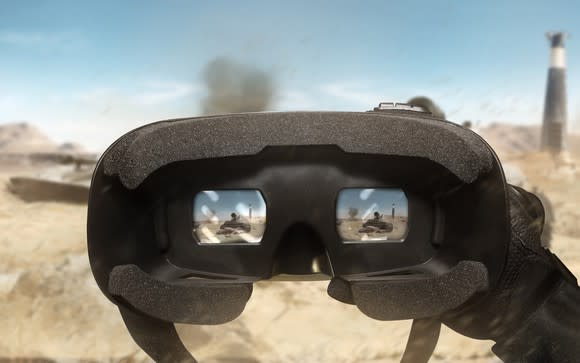Microsoft's HoloLens Deal With the Army Is a Big AR Win
Microsoft (NASDAQ: MSFT) has been plugging away at its HoloLens headset, and while the augmented-reality tech has won over a few clients -- mostly companies using it in industrial settings -- it has been pretty slow going.
However, in a significant milestone for the AR tech, Microsoft just won a $480 million contract with the U.S. Army, according to a recent report from Bloomberg. The Army had already been using HoloLenses in some training scenarios, but this deal will see the devices enhanced for combat use as well.
According to a document released by the Army, the government was looking for AR headsets that are capable of providing night vision and thermal sensing, as well as monitoring the wearer's vital signs, protecting their hearing, and even recognizing when they might have received a concussion.
These might seem like odd, or even unsettling, uses for Microsoft’s device, but the size of the deal is significant. The company will initially deliver 2,500 HoloLens units to the Army -- but eventually, this contract could lead to the purchase of up 100,000 units.
That would make the Army by far Microsoft's largest HoloLens customer. To date, it has sold about 50,000 HoloLens headsets.

Image source: Getty Images.
HoloLens’ slow start... and big opportunity
It’s no secret that HoloLens sales have been slow since the device launched more than two years ago. That’s not necessarily Microsoft’s fault; the broader augmented reality market has been slow to take off. Rival Apple is making a big push into the technology with its apps and developer tools -- and potentially its own AR glasses in a couple of years -- but it’s slow-going for the entire consumer AR market.
Last year, Microsoft’s HoloLens commercial lead, Roger Walkden, said in an interview:
"We’re not trying to sell hundreds of thousands or millions or anything, it’s expensive, and it’s not in huge numbers. So we’re happy with the level of sales that we’ve got -- I can’t tell you anything about the numbers, but it’s in thousands, not hundreds of thousands, and that’s fine. That’s all we need."
But, of course, Microsoft wants HoloLens sales to improve, and the Army deal should help. And the augmented reality market is worth waiting on. According to forecasts from IDC, the combined number of AR and VR headset shipments is expected to grow from 8.9 million in 2018 to 65.9 million by 2022.
Additionally, the U.S. military is extremely interested in making use of augmented and virtual reality headsets, and will reportedly spend up to $11 billion on the technologies by 2022.
Stay patient
Microsoft likely won’t focus all of its AR attention on military applications, but the Army contract is a vote of confidence -- and one that could help keep the company a key player in the space. The second-generation HoloLens is due out sometime in 2019, and you can bet that Microsoft has no intention of being left behind in the consumer headset market.
Just remember that it's going to be years, rather than months, before AR starts adding significantly to Microsoft's top or bottom lines. That’s the situation for nearly all major tech companies working in the space right now. However, this news shows that it is more than just a pet project that the company is toying around with. There are real uses for the device, and customers are seeing its potential.
More From The Motley Fool
Teresa Kersten, an employee of LinkedIn, a Microsoft subsidiary, is a member of The Motley Fool’s board of directors. Chris Neiger has no position in any of the stocks mentioned. The Motley Fool owns shares of and recommends Apple. The Motley Fool owns shares of Microsoft and has the following options: long January 2020 $150 calls on Apple and short January 2020 $155 calls on Apple. The Motley Fool has a disclosure policy.

 Yahoo Finance
Yahoo Finance 